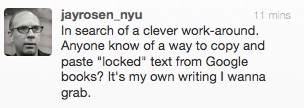The graffiti artist who painted the walls of Facebook’s first proper ‘corporate’ office in 2005 was offered $60,000 to do the job but opted for stock instead. That stock is supposedly worth $500m now. Smart lad. Smarter than Stanford, which was offered Cisco stock many years ago, but opted for cash instead.
Category Archives: Beyond belief
Sky News clamps down on Twitter use
It’s Back to the Future time, folks. This intriguing story from the Guardian
Sky News has told its journalists not to repost information from any Twitter users who are not an employee of the broadcaster.
An email to staff on Tuesday laid out new social media guidelines for Sky News employees, including a contentious ban on retweeting rival “journalists or people on Twitter”.
The new guidelines also warn Sky News journalists to “stick to your own beat” and not to tweet about non-work subjects from their professional accounts.
So much for the link economy, then. But the Digger’s (surprisingly entertaining) Twitterstream will, presumably, be exempt from the ban.
Facebook’s dodgy stats
Well, well. Facebook’s IPO Prospectus claims 845 million users, which is probably true. But it also claims that the number of “daily active users” is a whopping 483 million. Andrew Ross Sorkin of the New York Times found that number hard to swallow, so he went digging. And guess what? That number includes people like me who are registered Facebook users but almost never visit the site.
Facebook counts as “active” users who go to its Web site or its mobile site. But it also counts an entire other category of people who don’t click on facebook.com as “active users.” According to the company, a user is considered active if he or she “took an action to share content or activity with his or her Facebook friends or connections via a third-party Web site that is integrated with Facebook.”
Come again?
In other words, every time you press the “Like” button on NFL.com, for example, you’re an “active user” of Facebook. Perhaps you share a Twitter message on your Facebook account? That would make you an active Facebook user, too. Have you ever shared music on Spotify with a friend? You’re an active Facebook user. If you’ve logged into Huffington Post using your Facebook account and left a comment on the site — and your comment was automatically shared on Facebook — you, too, are an “active user” even though you’ve never actually spent any time on facebook.com.
“Think of what this means in terms of monetizing their ‘daily users,’ ” Barry Ritholtz, the chief executive and director for equity research for Fusion IQ, wrote on his blog. “If they click a ‘like’ button but do not go to Facebook that day, they cannot be marketed to, they do not see any advertising, they cannot be sold any goods or services. All they did was take advantage of FB’s extensive infrastructure to tell their FB friends (who may or may not see what they did) that they liked something online. Period.”
Facebook appears to be using the term “active” as a euphemism for “engaged” rather than how many users are actually going to its site every month.
I count as an “active user” because I’ve arranged for my Twitter stream to be fed to my Facebook account as a set of status updates. But as a member of Facebook’s advertising ecosystem I’m a dead loss because I never see an ad.
Zuck’s 2012 personal income tax bill: $1.5 billion
Spare a thought for the poor wee laddie. This from The Register.
If all goes according to plan, Facebook founder, chairman, and CEO Mark Zuckerberg’s share of the profit in his company’s upcoming initial public offering will result in him facing a tax bill of around $1.5bn for 2012.
What’s more, the Financial Times reports, that astronomical bill could increase if the IPO is more successful than many analysts believe.
Currently, the FT says, the stock is selling for around $40 per share in private secondary markets – a level that would net Lucky Zucky around $4.8bn at the IPO. Should the shares rise to a level that would put Facebook’s valuation at around $100bn – far from impossible in this wacky, bubbly world – the 27-year-old soon-to-be-squillionaire could net $6bn.
The company’s Form S-1 SEC filing earlier this week, which revealed the IPO plans, notes that Zuckerberg will use “substantially all of the net proceeds” that he will receive upon the sale of an as-yet undisclosed number of shares in the IPO to “satisfy taxes that he will incur upon his exercise of an outstanding stock option to purchase 120,000,000 shares of our Class B common stock.”
It’s nice to know that Zuckerberg’s wealth-management team is thinking ahead.
Those 120 million fully vested options that Zuckerberg plans to exercise, by the way, will cost him 6¢ per share. Remember that pittance when you read news of Facebook’s stock price on IPO day, which has yet to be scheduled.
As a result of the convoluted morass that is the US tax code, the profits that Zuckerberg will realize from excercising his options will be taxed as regular income, and not as capital gains…
Ironic type needed
[Source]
Satellite reconnaissance before digital photography
Fascinating piece by Alexis Madrigal in The Atlantic.
[US] satellite programs were ridiculous collaborations between optical specialists like the Perkin-Elmer researchers, Lockheed Martin’s satellite makers, Kodak’s film creators, and the Air Force’s pilots. Check out the AP’s description of the program and note the many points of virtuosity.
From 1971 to 1986 a total of 20 satellites were launched, each containing 60 miles (100 kilometers) of film and sophisticated cameras that orbited the earth snapping vast, panoramic photographs of the Soviet Union, China and other potential foes. The film was shot back through the earth’s atmosphere in buckets that parachuted over the Pacific Ocean, where C-130 Air Force planes snagged them with grappling hooks.
All of this is now detailed in the National Reconnaissance Office’s declassification reports about Hexagon, which include a 72-page overview produced in 1978 and marked TOP SECRET.
Interesting (if corny) video about it here.
Imagine a device containing 100km of film. I used to have trouble with less than 1m of 35-mm celluloid.
Wonder what the cameras were like.
The madness of Digital Restrictions Management
Truly, you could not make this up. Jay Rosen is one of the smartest and wisest commentators on the media in the online world. This tweet from him just popped up in my stream. All he wants to do is to get hold of his own stuff. Just another reason to be wary of the Google Books Project. It has lots of things going for it, of course: but one big downside: it will give one company a stranglehold on access to our literary heritage.
I’m reminded of Larry Lessig’s story of arriving in his office in Stanford one morning to find the campus police already installed in it. He was told that they had disconnected his computer from the university network because it was running peer-to-peer software. “Exactly!” they chorused — and then looked bemused as he explained that the stuff he shared using the software was all stuff he’d written himself.
A novel use for duct tape?
From Reuters.
(Reuters) – Two Arizona parents were arrested by sheriff’s deputies after apparently posting pictures on Facebook that showed their children, an infant and a toddler, bound with duct tape, authorities said on Thursday.
Coconino County deputies arrested Frankie Almuina, 20, and Kayla Almuina, 19, on suspicion of two counts of child abuse on Wednesday at their northern Arizona home after being alerted to the photos by an anonymous tip.
The children, a 2-year-old toddler and a 10-month-old infant, were seen online bound with duct tape on their wrists and ankles with their mouths taped shut, Commander Rex Gilliland told Reuters. One of the children was shown hanging upside down on an exercise machine.
The parents told investigators that the photos, posted on the mother’s Facebook account, were a joke and that the children were not harmed, Gilliland said.
If this hadn’t been filed by Reuters, I’d have thought it was a hoax.
Rationality’s feeble grip
This is the scariest thing I’ve seen all year: the mass hysteria in North Korea following on the death of yer man (whose name I can never remember). The big question is: is it really possible to induce this kind of mass hypnosis in millions of people? The answer: apparently, yes.
As Andrew McLaughlin (from whom I picked up the link) puts it:
It’s depressing to be reminded that it’s possible, with energetic and relentless propaganda, surveillance, and oppression, to delude vast numbers of human beings into genuine feelings of attachment to, and dependence on, a brutal sociopath responsible for the degradation and humiliation of millions, and the starvation and murder of millions more.
Watching the effects of a lifetime of propaganda and information control is a powerful spur to renew our commitment to freedom of speech and conscience, as well as to the protection of individual dignity. It’s an opportune moment for the Internet activist community to make a sustained push to subvert state control of networks and information flows in North Korea.
And, while we’re on the subject, have a look at this satellite image of North and South Korea by night — taken in September 2003 when the Great Leader was in his prime.
Patently absurd
From Slashdot.
“If you’re the giver or recipient of presents gift-wrapped by Amazon, you may want to take a gander at U.S. Patent No. 8,060,463, granted to Amazon last month for Mining of User Event Data to Identify Users with Common Interests. Among other things, Amazon explains the invention can be used to identify recipients of gifts as Christian or Jewish based on wrapping paper. From the patent: “The gift wrap used by such other users when purchasing gifts for this user, such as when the gift wrap evidences the user’s religion (in the case of Christmas or Hanukkah gift wrap, for example.)”
And then there’s this (also from Slashdot):
“You have to love a case where Warner Brothers, copyright maximalist extraordinaire, gets sued for ‘piracy,’ in this case for using a knock-off Louis Vuitton bag in a recent movie. This lawsuit has been described as ‘awkward’ for Warner; I have to agree with that characterization. Louis Vuitton’s 22-page complaint (PDF) alleges that Warner Bros. had knowledge that the bag was a knock-off, but went ahead and used it anyway. Apparently Warner Bros. takes IP rights seriously only when its own IP rights are involved.”
Groucho Marx, where are you when we need you?



